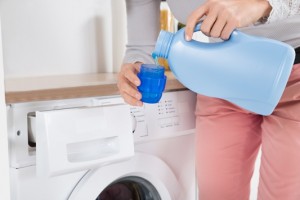Your nearest grocer or pharmacy likely carries a few detergent brands. Guaranteed, each differs in price and promise. One might fight stains harder while another boasts softer, brighter results. So which to choose?
Often, the answer is simple: it doesn’t matter. It comes down to preference and brand loyalty. That said, there are some products to avoid. Consider the information below to help you identify which bottles to put back onto the shelf.
Careful of Fragrances
Brands seldom sell one scent. They promote full lineups for different sensory preferences and applications (e.g. load dirtiness). While changing fragrances might keep things fresh, it may also lead to skin irritation and scratchy eyes.
Fragrance-related allergies are incredibly common. Those with sensitive skin are more likely to react from new scents and chemicals, especially when used on bedding.
When selecting a product, read the back of the bottle for any cautions. Warning labels typically accompany synthetic chemicals, which are known irritants.
Know Your Chemicals
Most detergents come with exceptions—materials best and worst suited for use. For example, the enzymes in biological detergents damage wool and silk delicates. Here are a few common enzymes:
- Amylase targets starch soils;
- Lipase removes fatty/oily soils;
- Protease attacks protein soils;
- Cellulase purges particulate soils.
The last enzyme, cellulase, is helpful in reducing pilling and discolouration. Pilling occurs when fabric fibers unravel and form tiny balls along the seams.
Different chemicals treat stains more effectively than others do. This, too, is something worth considering; not every article of clothing needs such treatment. Detergents harsh on stains are harsh on fabric, so use in moderation.
To learn more about common detergent chemicals, visit Branch Basics.
Match Your Machine
Some washing machines require high-efficiency detergents. These detergents rinse faster as they produce fewer soap studs.
Similarly, detergents these days now have hot and cold options. Most powder detergent need warm water to fully breakdown and absorb. Liquid varieties work in all temperatures (generally speaking!).
Note: Read the label to determine how much detergent your load needs. More soap does not mean cleaner clothes—quite the opposite. An overabundance of cleaner can lead to residual chemicals and bacterial build up.

